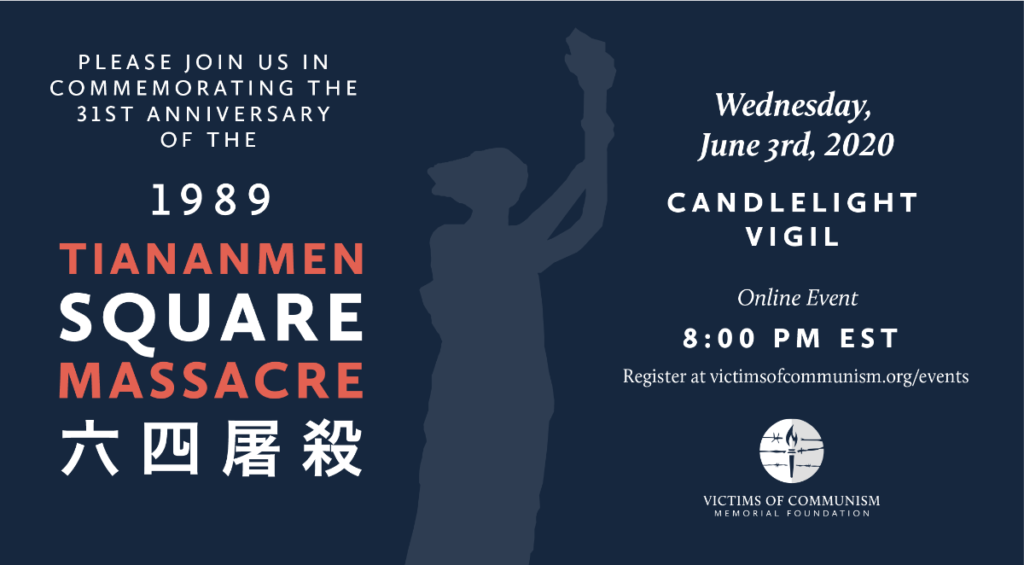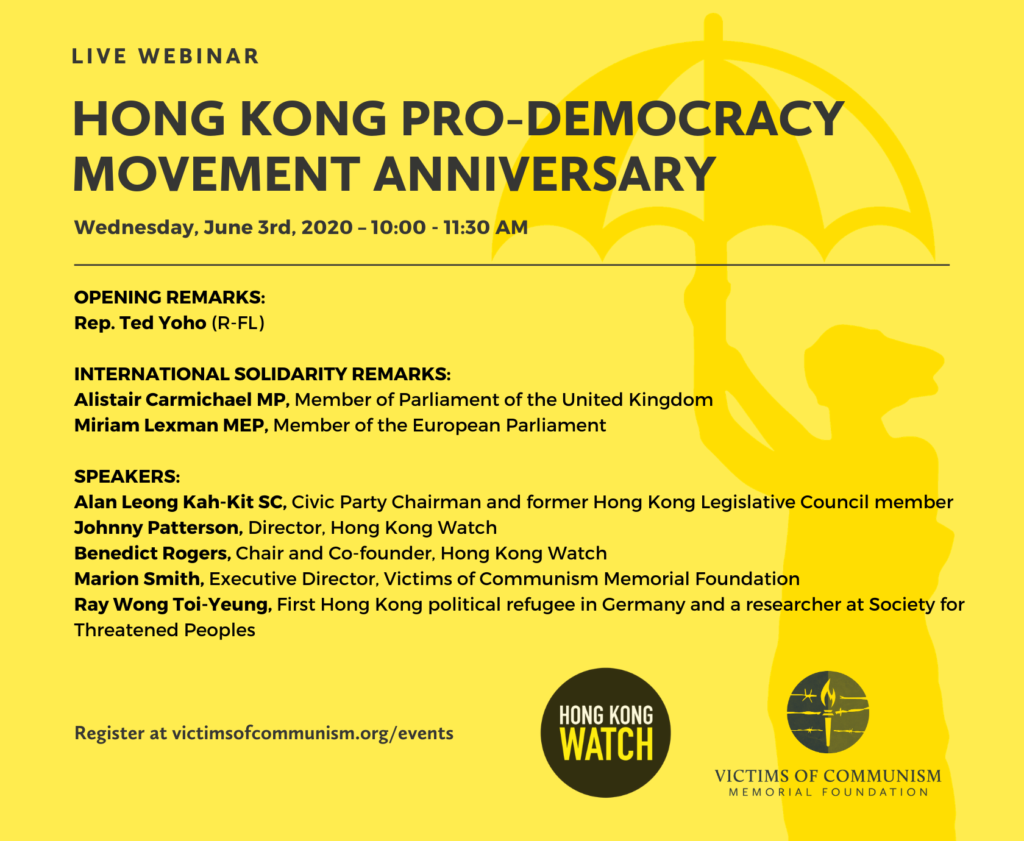
Hong Kong police rejected an application Monday by organizers for an annual candlelight vigil marking the anniversary this week of the 1989 Tiananmen Square crackdown, as residents rushed to apply for passports that could allow them to move to the United Kingdom, The Times reports.
In response the Hong Kong Alliance in Support of Patriotic Democratic Movements of China is asking Hong Kongers to hold individual commemorations through small gatherings, lighting candles at home, or online meetings on Thursday night, the 31st anniversary of the military crackdown, VOA adds.
Richard Tsoi, the group’s spokesman, told VOA that its members still plan to gather at Victoria Park to light candles in groups of eight, in order not to breach the government’s social distancing restrictions, and would stream the event live online.
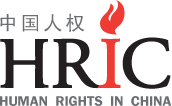 The ruling Communist party bears unavoidable responsibility for the harm done to all the citizens through the bloody tragedy that year, according to the Tiananmen Mothers. Legally, you owe the people accountability, and morally, you owe the people an apology for the following reasons, they write for Human Rights in China):
The ruling Communist party bears unavoidable responsibility for the harm done to all the citizens through the bloody tragedy that year, according to the Tiananmen Mothers. Legally, you owe the people accountability, and morally, you owe the people an apology for the following reasons, they write for Human Rights in China):
- … If the Chinese ruling Party and the Chinese government have not forgotten their original aspiration, they should abide by and implement the Founding Program and Constitution established in the early days of the founding of the country. However, in its highly centralized rule, the CPC has long forgotten the sacred rights conferred to citizens by the Constitution. We believe that the student movement of that year did not exceed the scope permitted by the law. …
- The government of a civilized society resolves social contradictions in accordance with the law, and resolving social contradictions is the daily responsibility of a government. However, what we saw was the total disregard of the law by those who were enthroned as the older generation of proletariat revolutionaries, who ignored the lives of the people and the existence of government functions. …
- Which civilized Chinese law expressly confers the government the right to use state military force to kill, at will, students and civilians in peaceful demonstrations? The Constitution provides that state military power is exercised by authorization by the National People’s Congress. ..We want to know exactly where and when the counterrevolutionary riots occurred? Where is the evidence? Who commanded the riots? What is the truth?
- A large nation that allows only one voice from the authorities and not the diverse voices of the people, and that is blind to the people’s well-intentioned criticism and supervision of the government’s inadequacies will only produce this result: the unlimited expansion of the authority of those wielding hefty power, who lord over the people from the top and unchecked by the law, with the so-called equality before the law serving as decoration for them.
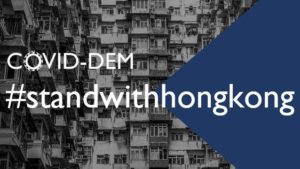 Survivors of the Tiananmen Square massacre, 31 years ago this week, escaped to freedom in Hong Kong, arriving on speed boats under cover of darkness fearful of being caught and returned, notes Nick Cater, executive director of the Menzies Research Centre.
Survivors of the Tiananmen Square massacre, 31 years ago this week, escaped to freedom in Hong Kong, arriving on speed boats under cover of darkness fearful of being caught and returned, notes Nick Cater, executive director of the Menzies Research Centre.
Today pro-democracy leaders have been fleeing Hong Kong for Taiwan, employing the same perilous means of transport. Again, they are trying to outrun the Hong Kong police, who this time are trying to stop them leaving, he writes for The Australian.
A cross-party international coalition of 760 parliamentarians and policymakers from 37 countries today issued a statement decrying Beijing’s ‘unilateral introduction of national security legislation in Hong Kong,’ and calling for sympathetic governments to unite against this ‘flagrant breach of the Sino-British Joint Declaration’, Hong Kong Watch reports.
 Led by the former Governor of Hong Kong, Lord Patten, and the former UK Foreign Secretary, Sir Malcolm Rifkind, the coalition comprises of a depth of expertise and experience including former prime ministers, foreign secretaries, defence ministers, prominent legal and human rights experts, diplomats, Senators, and Members of Parliament.
Led by the former Governor of Hong Kong, Lord Patten, and the former UK Foreign Secretary, Sir Malcolm Rifkind, the coalition comprises of a depth of expertise and experience including former prime ministers, foreign secretaries, defence ministers, prominent legal and human rights experts, diplomats, Senators, and Members of Parliament.
“The statement shows growing and widespread international outrage at the decision by the Chinese government to unilaterally impose national security legislation in Hong Kong,” Lord Patten of Barnes said. “The breadth of support, which spans all political parties and four continents, reflects both the severity of the situation and ongoing unified international support for the principle of one-country, two-systems.”
From the United States, it was signed by the Chairs of three separate House of Representatives Committees, as well as both co-chairs of the Congressional Executive Commission on China, and the ranking member of the Senate Foreign Relations Committee.
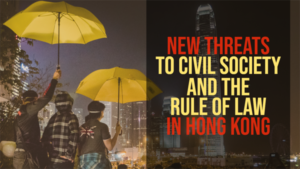
National Endowment for Democracy (NED)
The statement drew over 180 Canadian signatories, 165 British signatories, over 80 European Parliament signatories, more than 100 Japanese signatories, 35 US signatories, 30 German signatories, and 26 Australian signatories, including the Hon Michael Danby, former member for Melbourne Ports, former Chair of the Joint Standing Committee Foreign Affairs, Defence and Trade and a former member of the World Movement for Democracy steering committee.
In the long run, no move by Beijing will be able to squash the pro-democracy resolve of the people of Hong Kong, argues Adam Nelson, a senior adviser at the National Democratic Institute.
 I stand by the recommendations (right) we made to urge Beijing and Hong Kong and I also stand with the people of Hong Kong and my friends there who will continue to have their and their kids’ lives tied to the fortunes of the city and, as shown, have the resolve to demand their rights, he writes for The Hill:
I stand by the recommendations (right) we made to urge Beijing and Hong Kong and I also stand with the people of Hong Kong and my friends there who will continue to have their and their kids’ lives tied to the fortunes of the city and, as shown, have the resolve to demand their rights, he writes for The Hill:
Beijing cannot tag Hong Kongers as “foreign interventionists.” The bipartisan support for Hong Kong in Congress as well as the growing international solidarity for the city is heartening. My hope is that the global community continues to #StandwithHongKong and finds ways to bolster the remaining civic space promised to the people of Hong Kong.
